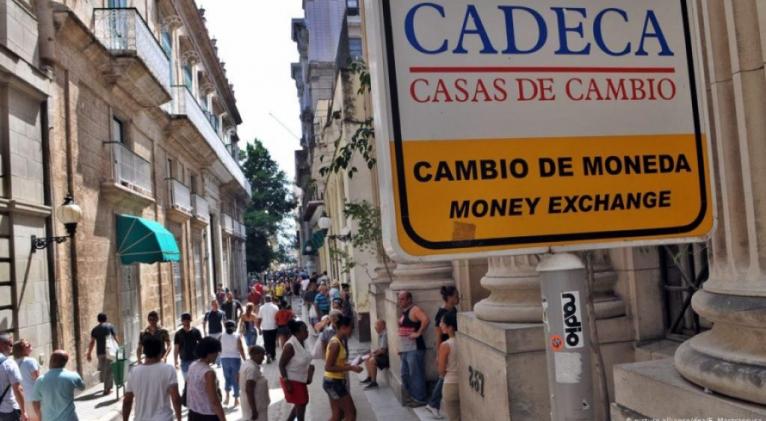The Need to Keep the Tax on the U.S. Dollar

While Cubans rush in crowds to the stores opened in the capital to acquire various items, using magnetic cards backed by bank accounts in USD, among other currencies, the question or doubt remains on why the Cuban government keeps the decision to tax the US dollar a 10%.
To those doubts or questions Granma newspaper answered with a wide explanation in its front page.
It was necessary to apply this measure in response to the bans of operating with such currencies in foreign banks, measures that are intensifying today and cause significant damage and create serious risks for the normal exercise of international financial affairs.
Cuba's determination to face the pressures and blackmails of the US while defending its economic and social model, guarantee the path of development and well-being for the entire population.
The United States has declared a unique war on Cuba, -without light, medium or heavy caliber weapons - other kinds of weapons, but just as lethal, after all, in trying to suffocate and starve a country, through limitations of all kinds to have a country give in its sovereignty and independence.
It must be said aloud over and over again: the blockade is an act of war, and the defense to resist it, a legitimate right.
On that principle is based the sovereign decision through which, in 2004, the Cuban Government established a 10% tax on US dollars in cash that entered the national banking system, in response to the banning of operating with such currencies in foreign banks.
To explain the degree of validity of the measure taken in 2004 and the reason why this mechanism still protects commercial operations from additional risks, a synthesis of the questions and answers provided by the Central Bank of Cuba is offered here.
Which causes triggered the government measure to establish the tax on US dollars (usd) in cash?
The Government of the United States increased the pressures and threats to foreign banks to prevent Cuba from depositing USD abroad in cash. This money was acquired through the payments made by the population and foreign visitors paid in the establishments which, at that time, operated in foreign currency.
The Deposits of North American dollars in foreign banks are essential to meet any country's commercial obligations, because the imports of products are not paid in cash, but through bank operations.
When dollars are received in bills, in order to be used in international transactions, Cuba must send them abroad and have banks that want to receive them, which implies high risks and additional costs.
In response to such actions, in 2004 the Cuban Central Bank issued Resolution No. 80 of October 23, with the fundamental objective of discouraging the entry of USD in cash to the Cuban banking and financial system.
When taxing the bills that would enter the country, two objectives would be met: to compensate for the costs and risks associated with their physical transfer abroad after the escalation of the blockade, and to motivate economically those who wish to enter money into the country, to do it using banks or through the use of other currencies (foreign currencies).
Why are only US dollars taxed in cash?
To discourage the entry of cash only from this specific currency.
Are bank transfers in USD received from abroad subject to taxes?
They are not subject to tax because bank transfers are not associated with the aforementioned costs and risks for the physical manipulation of USD in cash.
Are international card transactions taxed?
The operations associated with magnetic cards are not taxed with 10%. In Cuba, Visa or MasterCard cards not issued by US banks are accepted.
Why is it necessary to keep the validity of the tax to USD in cash?
In recent years, the U.S. Government has intensified its economic war against the people of Cuba, dictating new measures that cause significant damage and create serious risks for the normal exercise of international financial activity.
Therefore, the tendency to refuse operations with Cuban banks is increasingly growing by foreign banking and financial institutions.
The Cuban Central Bank reiterates that the tax established for operations in US dollars in cash has been and continues to be a subject of evaluation and permanent attention of the banking system and authorities from the Cuban Government.













Add new comment